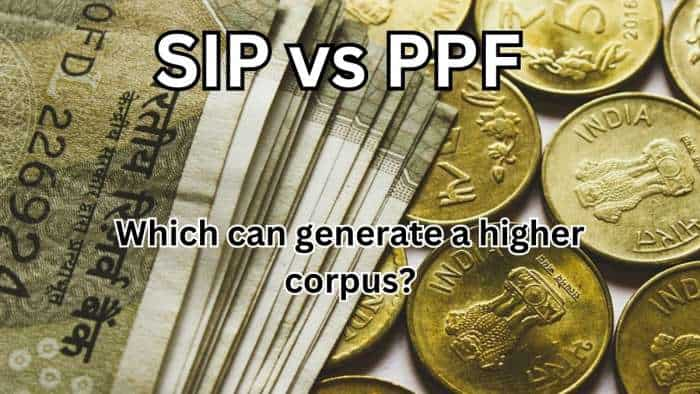Public Provident Fund (PPF) Vs Mutual Funds (MFs): What is better for you? Here's how you can benefit
PPF is a preferred investment option is because of its tax efficiency and its eligibility for tax deduction under section 80C. However, one can avail the same tax deduction of Rs. 1.50 Lakh, with higher post tax returns, by investing in ELSS (Equity Linked Saving Scheme). The returns from ELSS are higher even after considering the proposed long-term capital gains tax of 10%, that has been introduced in the recent budget.

Public Provident Fund (PPF) and Mutual Funds (MFs), both are popular investment avenues in today’s times. PPF has traditionally been a preferred investment option, due to its tax efficiency and guaranteed returns. Whereas, mutual funds in comparison are an investment avenue that have gained popularity among investors, in the last few years. While selecting any investment option, there are a lot of factors that an investor needs to account for, other than returns and tax efficiency. It is also important to take into consideration your investment time horizon, risk profile, liquidity needs, and most importantly your financial goals, before taking any investment decision.
PPF is a long-term, government-backed savings scheme which was launched to encourage savings among Indians in general, especially to encourage them to create a retirement corpus. It is a popular investment option as it offers guaranteed returns along with tax benefits. Mutual funds are investment vehicles, actively managed by professional fund managers. The savings of many investors are pooled and invested in diversified instruments, with a common investment objective.
Now let us understand which is a better investment option – PPF or Mutual Funds? Liquidity: Investments in PPF have a lock in period of 15 years, however funds can be partially withdrawn from the 7 th Year. This makes PPF a relatively illiquid form of investment. Mutual funds are a more liquid form of investment. Open-ended mutual funds have no lock in, and can be liquidated at any point of time. However, there may be some minimal exit load charges which are applicable if funds are redeemed before a specified period (usually 1-3 Years). Hence, from a liquidity perspective, mutual funds are a much better investment option.
Investment Time Horizon: Investment time horizon is one of the most important criteria’s, before selecting an investment option. If your investment time horizon is long term, it makes sense to invest in equity-oriented funds, where you can generate much higher returns as compared to PPF. Diversification: Diversification and strategic asset allocation are key factors to construct a well-balanced portfolio. Investments in PPF, will give an investor exposure to only debt instruments, whereas, mutual funds offer investments across asset classes such as Liquid,
Debt, Equity, Gold etc. One can select the type of fund to invest in depending on the investment objective and the strategy of the overall portfolio.
Tax Saving: One of the primary reasons, PPF is a preferred investment option is because of its tax efficiency and its eligibility for tax deduction under section 80C. However, one can avail the same tax deduction of Rs. 1.50 Lakh, with higher post tax returns, by investing in ELSS (Equity Linked Saving Scheme). The returns from ELSS are higher even after considering the proposed long-term capital gains tax of 10%, that has been introduced in the recent budget.
Post Tax Returns: From the perspective of capital protection and steady returns, post-tax returns from PPF and Debt Mutual funds are comparable. Debt funds are however, a better investment option, as they offer similar returns along with more liquidity, in comparison to PPF. Further, if one’s financial goals are long term, then equity oriented mutual funds, can deliver much higher post tax returns.
Eligibility: In terms of eligibility, only Indian Residents can open a PPF account. Further, an investor can only have one PPF account. However, in case of Mutual Funds, most fund houses accept investments from NRI investors as well. Also, there is no limit on investment or number of accounts in case of mutual fund investments.
Even though PPF is not a bad investment option, considering the above-mentioned factors, mutual funds have a clear advantage over PPF. However, it is advisable to consult a financial advisor, who will construct a goal based investment strategy based on your needs, financial goals, risk profile and overall financial situation.
(By Amar Pandit, CFA, Founder & Chief Happiness Officer at HappynessFactory.in)
Get Latest Business News, Stock Market Updates and Videos; Check your tax outgo through Income Tax Calculator and save money through our Personal Finance coverage. Check Business Breaking News Live on Zee Business Twitter and Facebook. Subscribe on YouTube.
RECOMMENDED STORIES

SBI Senior Citizen FD Rates: Want to invest Rs 3,00,000 in SBI FD? You can get this much maturity amount in 1 year, 3 years, and 5 years

EPS Pension Calculation: Rs 40,000 basic salary, 30 years of service, what will be your monthly EPS pension amount?

Retirement Planning: How one-time investment of Rs 11,00,000 can create a Rs 3,30,00,000 retirement corpus
01:18 PM IST









 PPF For Regular Income: How to get Rs 60,000/month tax-free income from Public Provident Fund?
PPF For Regular Income: How to get Rs 60,000/month tax-free income from Public Provident Fund? PPF For Regular Income: How to get Rs 1,20,000/month tax-free income from Public Provident Fund?
PPF For Regular Income: How to get Rs 1,20,000/month tax-free income from Public Provident Fund? PPF For Regular Income: How can you get Rs 12,87,575 annually tax-free income from Public Provident Fund?
PPF For Regular Income: How can you get Rs 12,87,575 annually tax-free income from Public Provident Fund? PPF For Regular Income: Can you get Rs 1,06,828/month tax-free income from Public Provident Fund?
PPF For Regular Income: Can you get Rs 1,06,828/month tax-free income from Public Provident Fund? PPF For Regular Income: Can you get Rs 85,000 a month, tax-free income from Public Provident Fund?
PPF For Regular Income: Can you get Rs 85,000 a month, tax-free income from Public Provident Fund?